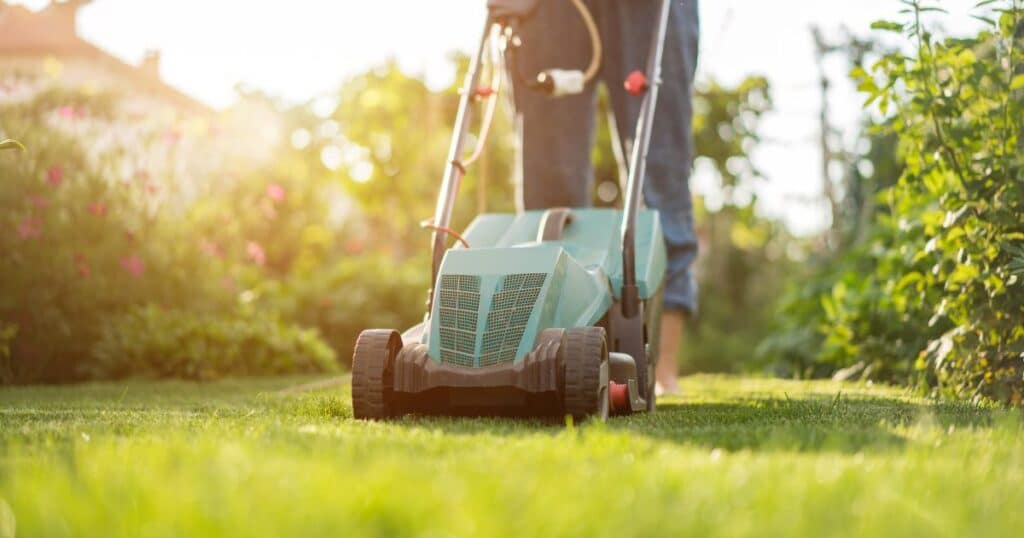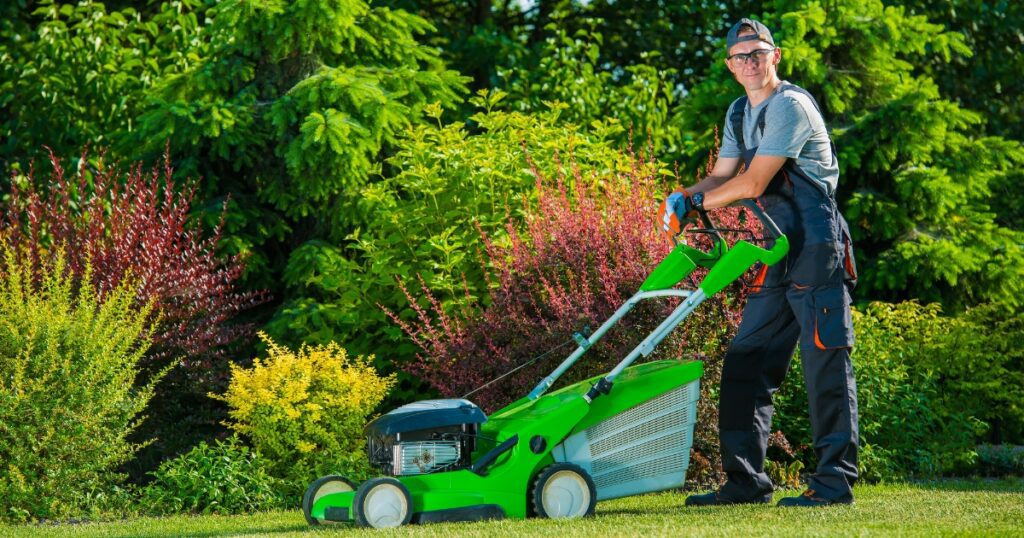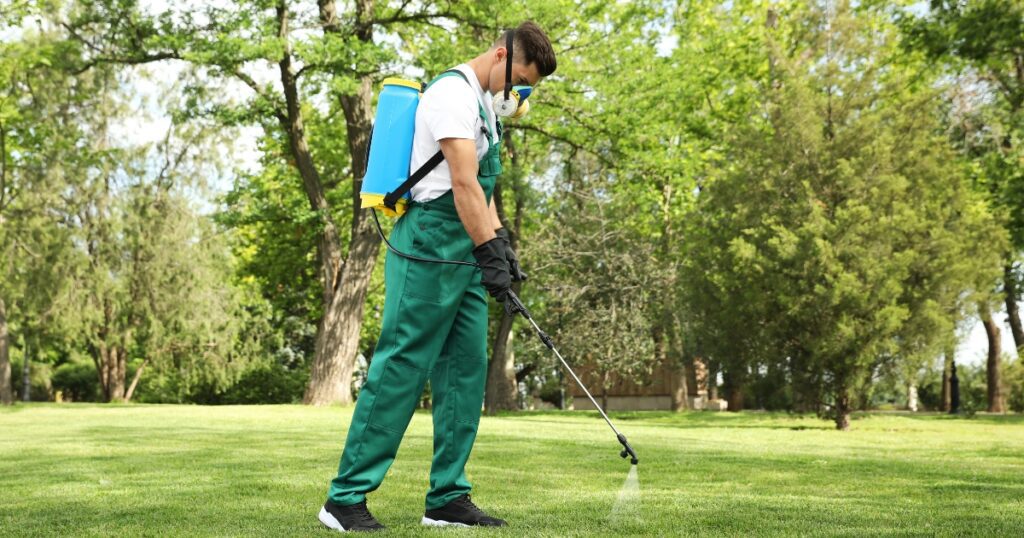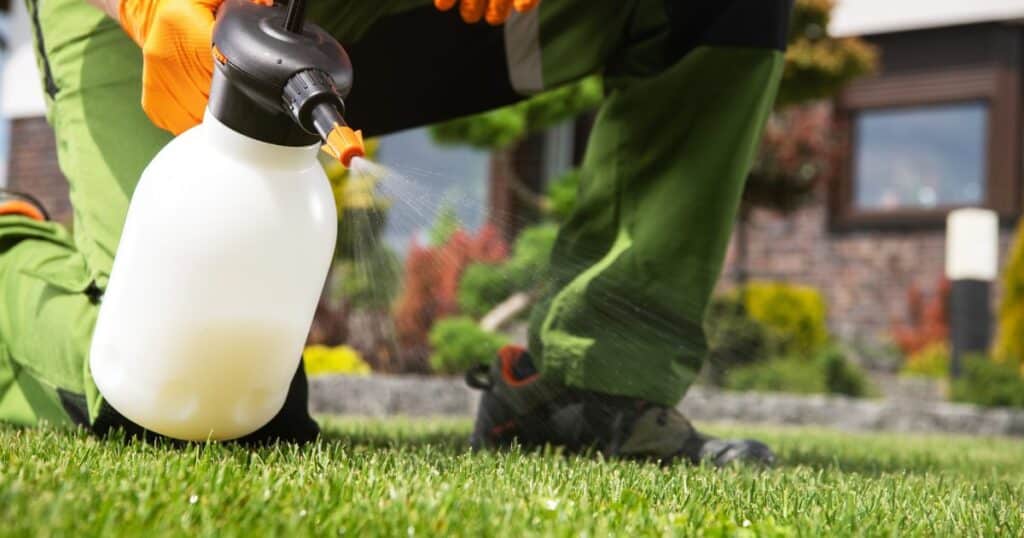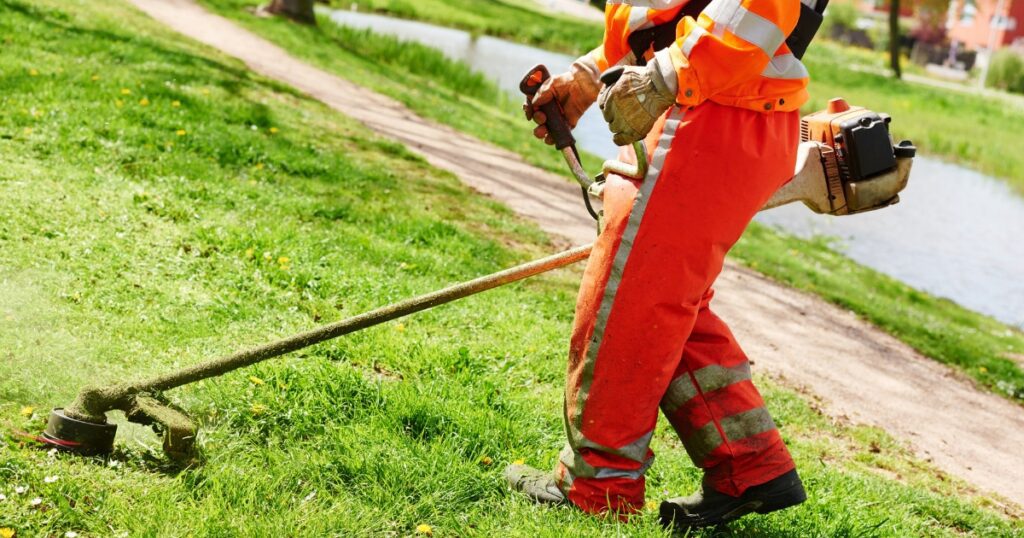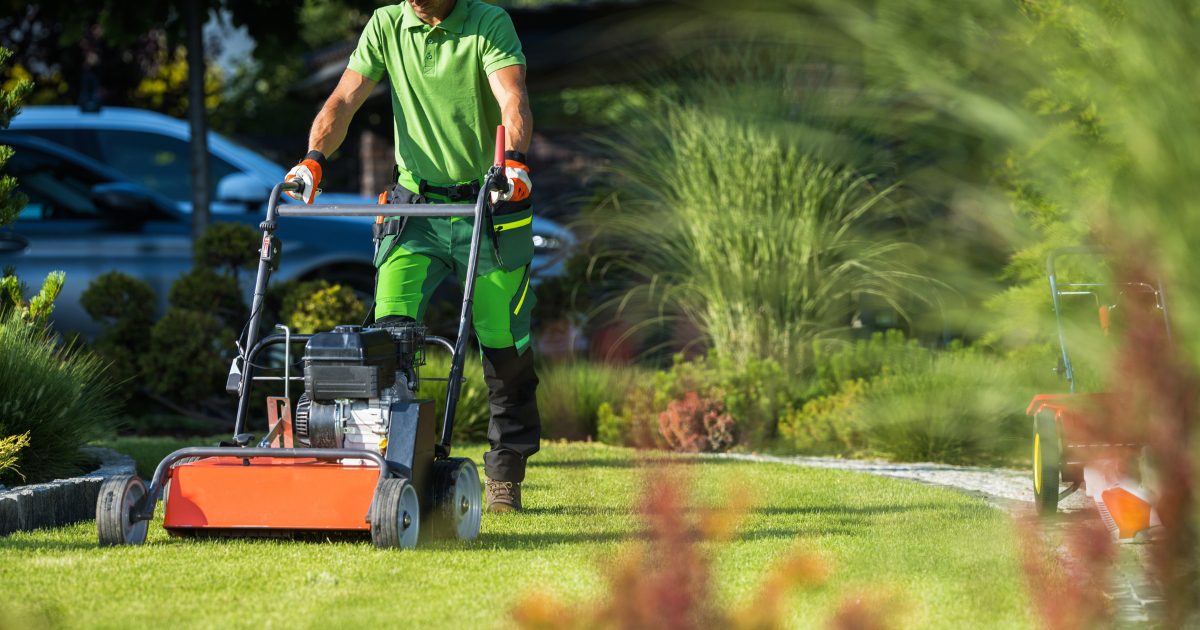
The Importance of Dallas Organic Lawn Care
Maintaining a lush, green lawn is a common goal for many homeowners. However, using traditional lawn care methods can pose risks to the environment and human health.
Inorganic fertilizers and pesticides contain harmful chemicals that can seep into the soil and groundwater or be ingested by pets or wildlife. These chemicals can lead to negative consequences such as reduced biodiversity, water pollution, and even human illness.
Organic lawn care offers an alternative approach that emphasizes natural techniques for maintaining healthy grass and soil without the use of synthetic chemicals. By using organic methods, you not only reduce the risk of environmental harm but also promote the healthier long-term growth of your property’s landscape.
Why Dallas is a Great Place for Organic Lawn Care
Dallas is an ideal location for implementing organic lawn care practices due to its climate conditions. The warm weather in Dallas allows grass to grow all year round, providing ample opportunities for natural growth without the need for chemical supplements.
Moreover, with droughts being fairly common in Texas, it makes sense to conserve water through organic lawn care techniques. Additionally, organic lawn care practices align well with Texan values of self-sufficiency and environmental stewardship.
This is reflected in several available resources in Dallas, such as community gardens and local farmers’ markets that emphasize fresh produce grown sustainably. Ultimately by embracing organic lawn care practices as a community, we can reduce our environmental impact while maintaining beautiful landscapes right here in Dallas.
The Benefits of Organic Lawn Care in Dallas
Organic lawn care is quickly becoming a popular alternative to traditional methods of maintaining a healthy lawn. It is easy to see why, given the numerous benefits it offers not just for your lawn but also for the environment and your community.
Improved Soil Health and Fertility
One of the most significant advantages of organic lawn care is that it helps improve soil health and fertility. The use of natural fertilizers such as compost, bone meal, and fish emulsion provides essential nutrients to the soil without damaging its delicate ecosystem. Conventional fertilizers often contain synthetic chemicals that can harm beneficial organisms in the soil, leading to long-term damage and nutrient depletion.
Moreover, organic lawn care practices such as proper mowing techniques and companion planting help create an environment where soil microorganisms can thrive. These microbes break down organic matter into valuable nutrients that plants can use to grow healthily and robustly.
Reduction in Water Usage and Costs
Dallas is known for its hot summers, which means water conservation is a crucial concern for homeowners with lawns. Organic lawn care offers significant water savings compared to traditional methods by promoting deep root growth and reducing surface evaporation. To achieve this deep-root growth, organic lawn care practices focus on using drought-resistant grasses that require less water than traditional turf species.
Additionally, by improving soil health through natural fertilizers and proper mowing techniques, lawns become more resilient during periods of drought stress. This translates to lower water bills for homeowners while maintaining healthy lawns throughout the summer months.
Elimination of Harmful Chemicals That Can Harm Pets, Wildlife, And Humans
The widespread use of synthetic pesticides on conventional lawns poses significant risks to pets, wildlife, and humans. These chemicals are not selective in their killing power and often harm beneficial insects and soil organisms along with pests. The use of organic lawn care methods eliminates the need for synthetic pesticides entirely, providing a safer environment for your family, pets, and local wildlife.
Moreover, organic lawn care practices such as composting promote the recycling of yard waste into natural fertilizers. This reduces the amount of waste that ends up in landfills while keeping harmful chemicals out of our ecosystem.
Increased Biodiversity And Support For Local Ecosystems
Organic lawn care practices support local ecosystems by promoting biodiversity. By using companion planting techniques and natural pest control measures such as neem oil or vinegar, you create an environment where beneficial insects thrive. These insects help to keep pest populations under control while also pollinating plants in your garden.
Organic lawn care has many benefits for homeowners looking to maintain a healthy lawn while protecting the environment and supporting their local community’s ecosystems. Improved soil health and fertility, reduced water usage and costs, elimination of harmful chemicals that can harm pets or humans, and increased biodiversity are just some of the advantages it offers.
Organic Lawn Care Techniques
The Use of Natural Fertilizers
One of the main principles of organic lawn care is to use natural fertilizers that are free from synthetic chemicals and toxins. Compost, bone meal, and fish emulsion are excellent options for promoting healthy grass growth without harming the environment. Compost is a great source of organic matter that can help improve soil structure, retain moisture, and increase nutrient content.
Bone meal is a slow-release fertilizer that provides essential nutrients such as phosphorus, which promotes root development. Fish emulsion is another effective fertilizer that contains high levels of nitrogen and can help stimulate leaf growth.
Proper Mowing Techniques for Healthy Grass Growth
Proper mowing techniques are critical for maintaining a healthy lawn without relying on hazardous chemicals or pesticides. One essential practice is to ensure that your mower blades are sharp to prevent tearing or damaging the grass blades.
It’s also essential to determine the right cutting height for your specific grass type since each variety has different requirements. For example, Bermuda grass should be cut at 1-1/2 to 2 inches in length, while St. Augustine grass requires a higher cut at 2-1/2 to 4 inches in length.
Companion Planting Strategies
Companion planting involves planting specific plants alongside your lawn grasses to deter pests and attract beneficial insects naturally. Some common companion plants include clover, dill, marigolds, and lavender, which all have properties that can repel unwanted critters such as mosquitoes or aphids while encouraging beneficial ones like ladybugs or honeybees into your garden space.
Integrated Pest Management Strategies
Integrated pest management (IPM) involves using environmentally conscious tactics instead of harmful chemicals when dealing with pests in your lawn care practices. This strategy involves identifying the root cause of the pest issue, monitoring for early signs of infestation, and using natural solutions such as insecticidal soaps or predator insects to combat the problem. By relying on eco-friendly methods, you can maintain a healthy lawn without contributing to environmental harm.
RELATED: Green Your Lawn with All-Natural Lawn Care Services in Dallas
Common Lawn Issues in Dallas and Organic Solutions
Drought Stress: Proper Watering Techniques, Use of Drought-Resistant Grasses
Dallas is known for its hot and dry summers, which can cause stress on lawns that are not properly irrigated. In fact, drought stress is one of the most common issues that homeowners face in this area.
However, there are some simple steps that can be taken to help alleviate this problem. Proper watering techniques are essential for maintaining healthy lawns during periods of drought.
Homeowners should aim to water their lawns deeply but infrequently to encourage deep root growth. This means watering the lawn for longer periods of time, but less frequently.
It’s also important to water early in the day when temperatures are cooler and evaporation rates are lower. Another solution for drought stress is to use drought-resistant grasses such as Bermuda or Zoysia.
These grasses have deep root systems that allow them to withstand drought conditions better than other varieties. They also require less water overall, making them a more sustainable choice for homeowners.
Weed Invasion: Hand-Pulling or Use of Natural Weed Control Methods Such as Vinegar or Corn Gluten Meal
Weeds can quickly take over a lawn if left unchecked, causing unsightly patches and competing with desirable plants for resources like water and nutrients. However, using chemical herbicides can harm beneficial insects like bees and butterflies, as well as pets and children who may come into contact with the treated area.
One organic solution for weed invasion is hand-pulling weeds regularly before they have a chance to spread too much. This method requires some effort but is highly effective when done consistently over time.
Another option is the use of natural weed control methods such as vinegar or corn gluten meal. Vinegar can be used by diluting it with water (1 part vinegar to 1 part water) and spraying it directly onto weeds.
Corn gluten meal, on the other hand, is a natural herbicide that prevents weed seeds from germinating. It can be applied to lawns in the spring or fall.
Pest Infestations: Use of Companion Planting or Natural Pest Control Methods Such as Neem Oil
Pests like insects and rodents can cause damage to lawns and gardens if left unchecked. However, using chemical pesticides can harm beneficial insects and disrupt the ecosystem balance. One organic solution for pest infestations is companion planting.
This involves planting certain plants together that have natural pest-repelling properties. For example, marigolds are known to deter nematodes (tiny soil-dwelling worms), while mint repels ants and aphids.
Another option is the use of natural pest control methods such as neem oil. Neem oil is derived from the seeds of the neem tree and has insecticidal properties that are effective against a wide range of pests.
It can be sprayed onto plants to repel pests or used as a soil drench to eliminate soil-dwelling pests like grubs. By using these organic solutions for common lawn issues in Dallas, homeowners can not only maintain healthy lawns but also contribute to a more sustainable and eco-friendly environment.
Local Resources for Organic Lawn Care in Dallas
List of Local Businesses for Organic Lawn Care Services
For those who prefer to have their lawn care handled by a professional, there are several local businesses in Dallas that specialize in organic and eco-friendly lawn care services. One such company is Texas Pure Products, which offers a range of organic services, including fertilization, weed control, and pest management.
Another option is Biosoils, which provides organic soil amendments and compost tea to promote healthy soil and plant growth. Additionally, GRO Green Organic Lawn Care offers customized lawn care plans tailored to each customer’s specific needs.
Community Resources: Composting Facilities and Gardening Clubs
Dallas has a variety of community resources available for those interested in organic lawn care and gardening. For example, the City of Dallas operates several composting facilities where residents can drop off yard waste to be turned into nutrient-rich compost that can then be used as fertilizer for lawns and gardens.
In addition to the city-run facilities, there are also several private companies that offer composting services in the area. For those looking to learn more about organic gardening techniques or connect with other like-minded individuals, there are several gardening clubs in the Dallas area.
The North Texas, Vegetable Gardeners group, meets monthly to discuss topics such as soil health, companion planting, and pest management. The Dallas Organic Garden Club hosts workshops on topics ranging from beekeeping to rainwater harvesting.
The Importance of Supporting Local Organic Lawn Care Resources
By choosing local businesses that specialize in organic lawn care or utilizing community resources such as composting facilities or gardening clubs, residents can not only improve the health of their own lawns but also support sustainable practices that benefit the entire community. In addition to reducing water usage and eliminating harmful chemicals that can harm pets and wildlife habitats, organic lawn care promotes biodiversity by supporting local ecosystems. By supporting organic lawn care resources in Dallas, residents can contribute to a healthier, more sustainable future for their community and the planet.
Frequently Asked Questions
How do I take care of my lawn organically?
To take care of your lawn organically, you can use natural soil amendments like compost or manure, practice proper watering and mowing techniques, and use natural weed and pest control methods such as hand-weeding, companion planting, and beneficial insects.
How long does it take for organic lawn fertilizer to work?
The time it takes for organic lawn fertilizer to work can vary depending on the specific product and soil conditions. Generally, it can take several weeks to several months to see the full effects of organic fertilizer.
What is used in organic lawn care?
Organic lawn care relies on natural methods and products that are free of synthetic chemicals and harmful pesticides. Common components used in organic lawn care include natural soil amendments, compost tea, and beneficial microbes.
Is organic lawn care better?
Organic lawn care can be a better choice for those looking to reduce their environmental impact and promote healthy soil and ecosystems. Organic lawn care also helps to avoid the potential health risks associated with exposure to synthetic chemicals.
How do you fertilize your lawn naturally?
To fertilize your lawn naturally, you can use natural soil amendments such as compost, manure, bone meal, or fish meal. Additionally, you can use natural pest control methods such as companion planting and introducing beneficial insects like ladybugs or lacewings.
When should I fertilize my lawn organic?
The best time to fertilize your lawn organically depends on the specific product and the needs of your lawn. Generally, it is recommended to fertilize in the spring and fall when the grass is actively growing and requires the most nutrients.
Conclusion
Organic lawn care can be a daunting task, but it is worth it for the long-term health of your lawn and the environment. By reducing chemical usage and promoting healthy soil, organic methods can create a thriving ecosystem that supports biodiversity and reduces water waste. In Dallas, where droughts are common, and temperatures can soar in the summer months, organic lawn care is especially important to maintain a healthy lawn while conserving resources.
By using natural fertilizers such as compost and bone meal, proper mowing techniques, and companion planting strategies, you can create an eco-friendly yard that is both beautiful and functional. In addition to the benefits for your own yard, organic lawn care also has positive impacts on the surrounding environment.
By eliminating harmful chemicals that can run off into local bodies of water or harm wildlife in your area, you are doing your part to promote a healthier planet overall. So go ahead and try out some organic methods for your Dallas lawn – not only will you benefit from them in the long term, but you’ll also be contributing to a more sustainable future for all.


